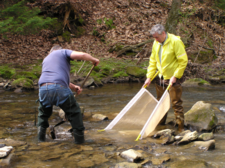

These studies involve monthly and biannual water monitoring procedures.
Our initial water monitoring work was done to gather baseline data for the major streams in the northern part of Venango County. The project started as a partnership between the Environmental Alliance for Senior Involvement (EASI) and DEPs Citizen Volunteer Monitoring Program (CVMP). The goal was to protect our streams from non-point source pollution.
Run off from farms, barn yard, golf courses and septic system leaks were anticipated sources. Algae blooms and fish kills were the anticipated problems. Acid mine drainage was also something we thought would be common. Since the area had working refineries, we also expected organic chemical pollution problems for some streams. Therefore our chemical monitoring involved testing for nitrates and phosphates from fertilizer and animal waste, sulfates, pH and conductance for detection of mine drainage and more general tests for dissolved oxygen and alkalinity. After years of testing on 14 streams we have accumulated a good set of baseline data. You can access the data from the table below or the Data Files link in the Water Monitoring menu.
Chemical testing is done using Hach color comparison and Hach Colorimeter test kits.
Each month volunteers conduct on site monitoring of pH and conductance using hand held meters. A sample of stream water is tested for the amount of dissolved oxygen (DO). Air and Water temperature and flow rates are measured and a water sample is collected for later analysis using a Hach kit to test for nitrate, phosphate, sulfate and alkalinity.
Nitrates in water
Phosphates in Water
Data collected is entered into a database that can be accessed at Google Drive by all interested persons. See the chart at the bottom of this page for links
A Habitat Assessment survey is used to compare the stream channel and riparian zone to standards to obtain a habitat index.
Monitoring Streams with Visual Assessments (Penn State)
The stream bottom is sampled using fine nets, and macro-invertebrates are collected, counted and grouped based on their tolerance to pollution. From this data a stream quality index is determined. After completion of the macro-invertebrate study the organisms are returned to the stream.
Macro-invertebrate Survey Form
New Macro tally sheet Updated by Bailey Kozalla, Venango Conservation District

Volunteer Stream Monitoring Interactive Verification Program (VSM-IVP) Macro Identification
During biannual studies some stream water is also tested for aluminum, iron and manganese (common pollutants from acid mine drainage and abandoned oil wells).
Watershed groups interested in making improvements to area streams can access the many years of baseline data we have collected. Local planning agencies can use the data to determine the environmental impact of planned development.
Volunteer water monitors are trained in the use of Hach color comparison and colorimeter test kits. Quality control is ensured through regular duplicates and standards testing.
You can access our data from the following table. Site location information is in the spreadsheet.
All Macro-invertebrate Survey (bio-survey) data is in one spreadsheet. Click the Macro link below to view the data. Once the sheet is loaded click the stream name tab at the top of the spreadsheet for the stream of interest.
| Site | Results | Results |
| Sandy Creek at Lake Wilhelm Dam | Macros | |
| Sandy Creek at Raymilton | Chemical | Macros |
| South Sandy Creek at Slatertown Rd | Chemical | Macros |
| Lower Two Mile Run (two sites) | Chemical | Macros |
| East Sandy Creek | Chemical | Macros |
| Cherry Run along Rt. 227 North of Pleasantville | Chemical | Macros |
| Little Sugar Creek at Rt 428 bridge | Chemical | Macros |
| Mill Creek | Chemical | Macros |
| Oil Creek at Oil City | Chemical | Macros |
| Prather Run at Rt 428 bridge | Chemical | Macros |
| Scrubgrass Creek | Chemical | Macros |
| Shull Run | Chemical | Macros |
| Sugar Creek at Cooperstown | Chemical | Macros |
| Upper Two Mile Run 0.1 miles above Justice Lake | Chemical | Macros |
| UnNamed tributary of Two Mile Run at Pioneer Flats | Macros |
Citizen Scientists May Be An Untapped Resource For Water Quality Improvement By Matt Swayne, Penn State News
The acronim stands for Citizins Volunteer Monitoring Program. The program was a DEP sponsored program to involve senior citizens and other community groups in obtaning environmental data for DEP.
The following was taken from a DEP document.
"In July 2009, due to budget constraints, DEP began limiting its direct technical and financial support for volunteer monitors to specific projects that result in the generation of quality assured data related to DEP’s highest priorities. Projects related to DEP’s priorities include working with program staff and volunteers to monitor sections of streams to assess impacts from stream restoration projects, best management practices and abandoned mine land remediation projects, which are supported by 319 Non-point Source Program or DEP monies. Conservation Reserve Enhancement Program (CREP) activities are also being monitored to assess the effectiveness of these practices. As priorities change and needs arise, DEP will continue to work with volunteers in monitoring the effectiveness of projects. Requests from volunteer monitors for services previously provided by DEP such as routine technical assistance and training on preparation and implementation of a locally driven monitoring plan are being directed to the Consortium for Scientific Assistance to Watersheds (CSAW) or Nature Abounds. The Consortium, a group of service providers, is funded through a Growing Greener grant administered by DEP while Nature Abounds, a nonprofit organization, has a 319 Non-point Source Management grant to support the Pennsylvania Senior Environment Corps program and monitoring"
Most of the support for the original PA SEC programs has been take over by Nature Abounds.